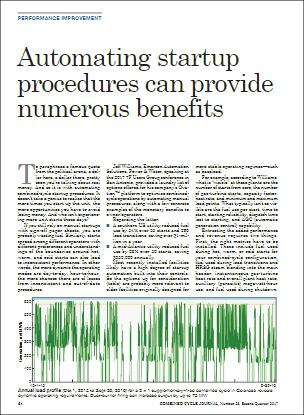In combined cycle power plants:
…the heat of the gas turbine’s exhaust is used to generate steam by passing it through a heat recovery steam generator (HRSG) with a live steam temperature between 420 and 580 °C. The condenser of the Rankine cycle is usually cooled by water from a lake, river, sea or cooling towers.
Over the past decades, combined cycle power plants were built to handle base electrical loads for utilities. Today, given changes in the market for supplying electricity and more energy from variable renewable sources, combined cycle plants are also:
Optimizing the startup and shutdown sequences in these processes can have an impact on the power producer’s bottom line. A Combined Cycle Journal article, Automating startup procedures can provide numerous benefits, recaps a presentation by Emerson’s Jeff Williams given at the 2017 7F Users Group conference.…used to cover intermediate and peak load constraints. Therefore, new plants shall be designed for cycling load regimes, to meet recent power market requirements for fluctuating operation, so to cover the daily and seasonal variation of the electricity demand.
 For combined cycle plants designed for more stable modes, such as baseload operations, manual startup sequences are typically still in use. These manual procedures can introduce delays, inconsistencies between operators and other losses in time and fuel use. Jeff notes that what is typically visible:
For combined cycle plants designed for more stable modes, such as baseload operations, manual startup sequences are typically still in use. These manual procedures can introduce delays, inconsistencies between operators and other losses in time and fuel use. Jeff notes that what is typically visible:
…are the number of starts from zero, the number of gas-turbine starts, capacity factor, heat rate, and minimum and maximum load points.
What’s not typically visible:
…are the fuel use per start, time to start, starting reliability, dispatch time lost to starting, and AGC (automatic generation control) capability.
Measures required for more efficient startups include:
…fuel used during hot, warm, or cold starts for your combined-cycle configuration; fuel used during load transitions and HRSG steam blending into the main header; instantaneous gas-turbine heat rate and overall plant heat rate; auxiliary (parasitic) megawatt-hour use; and fuel used during shutdown. These metrics are then used to generate reports and establish different plant operating profiles.
The startup procedures should be automated in sequence function charts in the control system with controls for operators to override steps, such as hold, abort, manual mode and override. Automating these steps can save time, reduce stress and minimize maintenance on the equipment, identify conditions in advance which might prevent successful startups, and optimize operations for ambient conditions. The Ovation Advanced Power Application provides adaptive improvements to help achieve optimized equipment performance over different operating ranges.
Jeff pointed to two case studies where quantified financial results were achieved by automating startup procedures:
- A southern US utility reduced fuel use by 54% over 55 starts and 290 load transitions, saving over $1-million in a year.
- A mid-Atlantic utility reduced fuel use by 26% over 50 starts, saving $250,000 annually.
Read the article for more on options to achieve more consistent performance under dynamic operating ranges. You can also connect and interact with other power generation and control system experts in the Power and Ovation groups in the Emerson Exchange 365 community.





